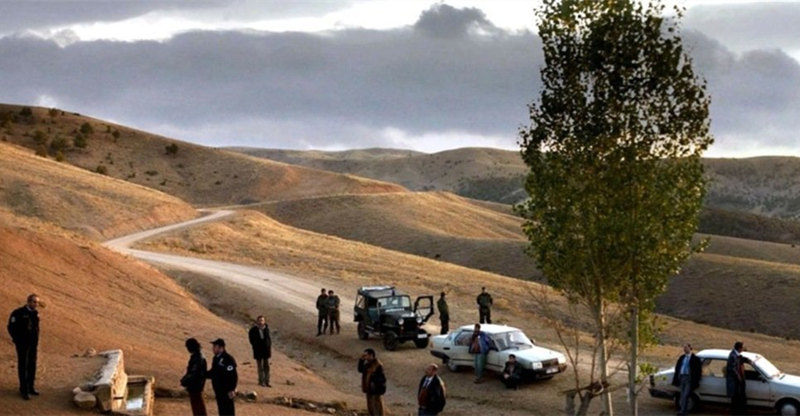In an opening voiceover, Matt King (George Clooney)—a successful attorney living on Oahu whose great grandfather married Hawaiian royalty, then inherited a huge chunk of island real estate—says that people think if you live in paradise you’ve got it made. But people in paradise still get cancer, he says, and they still suffer losses and heartbreaks.
True, but if you or a loved one has been ravaged by disease or debilitating accident, it’s certainly more calming and curative to go to the beach and watch the waves come in, as Matt and his daughters do after his wife and their mother has a boating accident that puts her in a coma on life support, than it is to sit on the front stoop in a blighted neighborhood full of gangs, addicts, and pollution. When you’re dealing with grief, it’s certainly nicer to have the money to just jump on a plane to another island and check into a hotel, without having to ratchet up your credit card debt or wonder how you’ll pay for it all, adding to the stress.
And director Alexander Payne knows it. Hawaii is the eye-candy in this film that makes it possible for audiences to sit through what seems like real-time stupefaction and grief. The scenery and the Hawaiian music soundtrack are a constant presence, a healing balm, and the whole idea of paradise and privilege comes up a number of times. Eventually Clooney’s character has an epiphany that everyone in the audience who doesn’t live in paradise has already had. It’s the same principal as in real estate: location, location, location. The land matters.
I’m guessing the King family’s royal lineage and inherited life of privilege will be on the minds of a lot of the people who watch this film and who don’t live in affluence. Recently Ann Romney said, “I don’t even consider myself wealthy.” There are exceptions, of course, but most wealthy people have no perspective. I say this because one of the triumphs of “The Descendants,” which is based on a novel by Kaui Hart Hemmings, is that it transcends class. It pulls us into the lives of this family and makes us identify with them, even if they have enough money to send one daughter to a $35,000 per year private school. Even if they jet here and there. Even if they own enough land as a family to where the entire Hawaiian islands are on the edge of their beach chairs wondering whether they’ll sell the land to developers or figure out a way to keep it as a public heritage.
“The Descendants” earned another adapted screenplay Oscar for Alexander Payne—who previously won for “About Schmidt” (2002). But this film offers a much stronger script than “Schmidt,” which was more of an episodic road trip. There’s just a lot more going on. A family has to deal with grief and the burden of having to inform all of the relatives and friends, while still keeping things from the youngest one (Amara Miller); a “back-up parent” grapples with the fact that he doesn’t know his two daughters and hasn’t a clue how to parent them; a teen daughter wrestles with her guilt over not having spoken to the mother for three days prior to the accident because she discovered the mom was having an affair; the father, oddly enough, draws closer to his daughter because of this added twist; King is the trustee in charge of family land who’s deciding who to sell it to, or whether to sell; and King and the whole family set out for another island in pursuit of the guy who was having an affair with Mrs. King. And everywhere is that lush backdrop of Hawaii and the wash of ukulele tunes sung in Hawaiian.
Clooney was nominated for a Best Actor Oscar, and he’s certainly deserving of the honor, while “The Descendants” also received nominations for Best Picture, Best Film Editing, and Best Direction. Shailene Woodley (“The Secret Life of the American Teenager”) also should have gotten a nomination, but it was a crowded field for Supporting Actresses this past year. Woodley plays out-of-control daughter Alex, who’s fighting a drug problem and an affinity for older guys. Her “friend” Sid (Nick Krause) isn’t the brightest bulb in the marquee, though he thinks he’s smart and even says so out loud—to which Matt replies, “You’re a hundred miles from smart.”
There are enough comic lines and situations in this film to qualify “The Descendants” for a dramedy or dark comedy, but for the most part it’s unrelenting drama. It could have been unrelenting melodrama, but there’s enough music, scenery, and complex emotions to keep that from happening. At 115 minutes, though, it starts to feel long, and the whole she’s-dying-say-goodbye thing tends to drag on. If Payne could have brought himself to cut another 15 minutes from the final third of the movie it would have been stronger. But that’s my only complaint. Otherwise, “The Descendants” really was one of the best films that 2012 had to offer—deserving of its Best Picture nomination.
Video:
It would have been heartbreaking if the video wasn’t showcase quality, because all of this terrific Hawaiian greenery and dramatic landscapes needed to be you-are-there sharp. And while some scenes appear just a little on the soft side or lacking strong blacks, for the most part “The Descendants” has just enough filmic grain to be pleasing and enough detail to make you wish you could book your flight tomorrow. Colors are richly hued, skin-tones are natural looking and tanned (not spray-tanned!), and the AVC/MPEG-4 transfer presents the 35mm film with no noise and no DNR apparent. If there are artifacts here, I didn’t notice them. The picture looks gorgeous, especially in 2.40:1 widescreen.
Audio:
The featured audio is an English DTS-HD MA 5.1 that does a nice job of channeling the sound with clarity and distributing it naturally across the sound field. I wouldn’t call it a dynamic track, but the music, which washes over you and laps at your consciousness like the ocean waves, is cleanly and precisely rendered. Dialogue is clear and nicely prioritized, and there’s just enough ambient sounds to make you feel the atmosphere. Additional audio options are an English Descriptive, Spanish, or French Dolby Digital 5.1, with subtitles in English SDH and Spanish.
Extras:
There’s actually a lot here, but it struck me as a something-for-everyone grouping of bonus features. Some will go for the three music videos that feature more travelogue shots of Hawaii. Others might like the two deleted scenes (6 min.) with introductions of why they were cut. Those who go for behind-the-scenes features get a “Working with Water” (11 min.) extra about the difficulties of filming on the water, and “Hawaiian Style” (17 min.) is shows the Hawaiian blessing that launched filming, with cast and crew interviews. If you go for the tributes, Clooney gets a 7-minute feature in which everyone says how great he is to work with, and Payne gets 13 minutes of the same sort of thing—longer, because he shows how he makes his omelets (?). Payne turns up on a “Casting” feature (8 min.) as well. And for just plain fun there’s a 3-minute montage of more behind-the-scenes clips, no narration, and “The World Parade,” a 10-minute silent feature that includes footage of Hawaii around the time that Matt King’s great-grandfather and great-grandmother got together. The theatrical trailer rounds out the bonus features.
Bottom line:
“The Descendants” goes on too long, but that’s its only flaw. And frankly, I can see why Payne and his editor decided to go with this print instead of making some awfully tough decisions.


